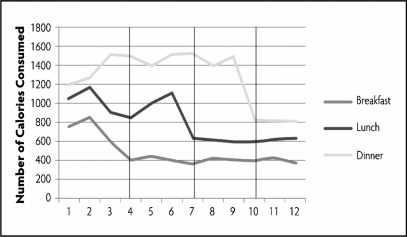Dr.Anderson is a nutritionist who helps clients lose weight prior to surgery.She is working with W.J. ,a male client who is planning on undergoing a heart transplant.He currently eats more than 3,500 calories a day and has been asked by his doctor to cut the number of calories to about 1,800 (400 for breakfast,600 for lunch,and 800 for dinner) .She is curious as to whether a food journal will help W.J.reduce the number of calories he eats.A food journal is used to record everything a person eats.Dr.Anderson decides to phase in the food journal gradually,initially only recording what is eaten at breakfast during the first three days after baseline (days 4-6) .During days 7-9,the journal is used at lunch,too,and during days 10-12,it also is used during dinner.Each day,Dr.Anderson's client sends her entries from the food journal and the number of calories he ate at each meal (as calculated by his wife,whose help she enlisted) .The data for Dr.Anderson's study are below.

-Which of the following does NOT allow Dr.Anderson to conclude that keeping a food journal caused weight loss in W.J.?
A) Lunch calories did not decrease on Day 4.
B) Breakfast calories decreased on Day 4.
C) Dinner calories did not decrease on Day 7
D) Calorie intakes for the three meals differed on Day 1.
Correct Answer:
Verified
Q21:
Dr.Anderson is a nutritionist who helps clients
Q21: Seeing stability in a stable-baseline design can
Q22: The fact that the researcher does not
Q23:
Dr.Anderson is a nutritionist who helps clients
Q23: If a researcher is concerned about external
Q24: In a nonequivalent control group interrupted time
Q28:
Dr.Anderson is a nutritionist who helps clients
Q30: Which of the following topics would NOT
Q35: Which of the following is NOT a
Q41: How does a researcher who conducts a
Unlock this Answer For Free Now!
View this answer and more for free by performing one of the following actions

Scan the QR code to install the App and get 2 free unlocks

Unlock quizzes for free by uploading documents